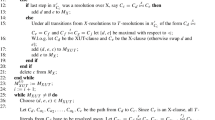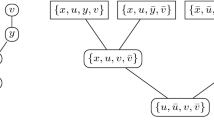Abstract
QCDCL is one of the main algorithmic paradigms for solving quantified Boolean formulas (QBF). We design a new technique to show lower bounds for the running time in QCDCL algorithms. For this we model QCDCL by concisely defined proof systems and identify a new width measure for formulas, which we call gauge. We show that for a large class of QBFs, large (e.g. linear) gauge implies exponential lower bounds for QCDCL proof size.
We illustrate our technique by computing the gauge for a number of sample QBFs, thereby providing new exponential lower bounds for QCDCL. Our technique is the first bespoke lower bound technique for QCDCL.
Access this chapter
Tax calculation will be finalised at checkout
Purchases are for personal use only
Similar content being viewed by others
Notes
- 1.
The existential width of a clause is defined as the number of existential literals in this clause. The existential proof width is defined as the maximal existential width over all clauses in this proof.
References
Balabanov, V., Jiang, J.H.R.: Unified QBF certification and its applications. Form. Methods Syst. Des. 41(1), 45–65 (2012)
Balabanov, V., Widl, M., Jiang, J.H.R.: QBF resolution systems and their proof complexities. In: Proceedings of Theory and Applications of Satisfiability Testing (SAT), pp. 154–169 (2014)
Beame, P., Kautz, H.A., Sabharwal, A.: Towards understanding and harnessing the potential of clause learning. J. Artif. Intell. Res. (JAIR) 22, 319–351 (2004)
Ben-Sasson, E., Wigderson, A.: Short proofs are narrow - resolution made simple. J. ACM 48(2), 149–169 (2001)
Beyersdorff, O., Blinkhorn, J., Hinde, L.: Size, cost, and capacity: a semantic technique for hard random QBFs. Logical Methods Comput. Sci 15(1), 13:1–13:39 (2019)
Beyersdorff, O., Blinkhorn, J., Mahajan, M.: Hardness characterisations and size-width lower bounds for QBF resolution. In: Proceedings of ACM/IEEE Symposium on Logic in Computer Science (LICS), pp. 209–223. ACM (2020)
Beyersdorff, O., Böhm, B.: Understanding the relative strength of QBF CDCL solvers and QBF resolution. In: Proceedings of Innovations in Theoretical Computer Science (ITCS), pp. 12:1–12:20 (2021)
Beyersdorff, O., Bonacina, I., Chew, L., Pich, J.: Frege systems for quantified Boolean logic. J. ACM 67(2), 1–36 (2020)
Beyersdorff, O., Chew, L., Janota, M.: New resolution-based QBF calculi and their proof complexity. ACM Trans. Comput. Theor. 11(4), 26:1–26:42 (2019)
Beyersdorff, O., Chew, L., Mahajan, M., Shukla, A.: Feasible interpolation for QBF resolution calculi. Logical Methods Comput. Sci. 13, 7:1–7:20 (2017)
Beyersdorff, O., Chew, L., Mahajan, M., Shukla, A.: Are short proofs narrow? QBF resolution is not so simple. ACM Trans. Comput. Logic 19, 1–26 (2018)
Beyersdorff, O., Chew, L., Sreenivasaiah, K.: A game characterisation of tree-like Q-resolution size. J. Comput. Syst. Sci. 104, 82–101 (2019)
Beyersdorff, O., Hinde, L., Pich, J.: Reasons for hardness in QBF proof systems. ACM Trans. Comput. Theor. 12(2), 1–27 (2020)
Beyersdorff, O., Janota, M., Lonsing, F., Seidl, M.: Quantified Boolean formulas. In: Biere, A., Heule, M., van Maaren, H., Walsh, T. (eds.) Handbook of Satisfiability, 2nd edn. IOS press, Frontiers in Artificial Intelligence and Applications (2021)
Clymo, J., Beyersdorff, O.: Relating size and width in variants of Q-resolution. Inf. Process. Lett. 138, 1–6 (2018)
Egly, U., Lonsing, F., Widl, M.: Long-distance resolution: Proof generation and strategy extraction in search-based QBF solving. In: Proceedings of Logic for Programming, Artificial Intelligence, and Reasoning (LPAR), pp. 291–308 (2013)
Giunchiglia, E., Narizzano, M., Tacchella, A.: Clause/term resolution and learning in the evaluation of quantified Boolean formulas. J. Artif. Intell. Res. 26, 371–416 (2006)
Haken, A.: The intractability of resolution. Theor. Comput. Sci. 39, 297–308 (1985)
Janota, M.: On Q-Resolution and CDCL QBF solving. In: Proceedings of International Conference on Theory and Applications of Satisfiability Testing (SAT), pp. 402–418 (2016)
Janota, M., Marques-Silva, J.: Expansion-based QBF solving versus Q-resolution. Theor. Comput. Sci. 577, 25–42 (2015)
Kleine Büning, H., Karpinski, M., Flögel, A.: Resolution for quantified Boolean formulas. Inf. Comput. 117(1), 12–18 (1995)
Krajíček, J.: Proof complexity, Encyclopedia of Mathematics and Its Applications, vol. 170. Cambridge University Press (2019)
Lonsing, F.: Dependency Schemes and Search-Based QBF Solving: Theory and Practice. Ph.D. thesis, Johannes Kepler University Linz (2012)
Lonsing, F., Egly, U.: DepQBF 6.0: A search-based QBF solver beyond traditional QCDCL. In: Proceedings of International Conference on Automated Deduction (CADE), pp. 371–384 (2017)
Lonsing, F., Egly, U.: Evaluating QBF solvers: quantifier alternations matter. In: Hooker, J. (ed.) CP 2018. LNCS, vol. 11008, pp. 276–294. Springer, Cham (2018). https://doi.org/10.1007/978-3-319-98334-9_19
Lonsing, F., Egly, U., Seidl, M.: Q-resolution with generalized axioms. In: Creignou, N., Le Berre, D. (eds.) SAT 2016. LNCS, vol. 9710, pp. 435–452. Springer, Cham (2016). https://doi.org/10.1007/978-3-319-40970-2_27
Marques Silva, J.P., Lynce, I., Malik, S.: Conflict-driven clause learning SAT solvers. In: Handbook of Satisfiability. IOS Press (2009)
Peitl, T., Slivovsky, F., Szeider, S.: Dependency learning for QBF. J. Artif. Intell. Res. 65, 180–208 (2019)
Pipatsrisawat, K., Darwiche, A.: On the power of clause-learning SAT solvers as resolution engines. Artif. Intell. 175(2), 512–525 (2011)
Pulina, L., Seidl, M.: The 2016 and 2017 QBF solvers evaluations (QBFEVAL’16 and QBFEVAL’17). Artif. Intell. 274, 224–248 (2019)
Shukla, A., Biere, A., Pulina, L., Seidl, M.: A survey on applications of quantified Boolean formulas. In: Proceedings of IEEE International Conference on Tools with Artificial Intelligence (ICTAI), pp. 78–84 (2019)
Vinyals, M.: Hard examples for common variable decision heuristics. In: Proceedings of the AAAI Conference on Artificial Intelligence (AAAI) (2020)
Zhang, L., Madigan, C.F., Moskewicz, M.W., Malik, S.: Efficient conflict driven learning in Boolean satisfiability solver. In: Proceedings of IEEE/ACM International Conference on Computer-Aided Design (ICCAD), pp. 279–285 (2001)
Zhang, L., Malik, S.: Conflict driven learning in a quantified Boolean satisfiability solver. In: Proceedings of IEEE/ACM International Conference on Computer-aided Design (ICCAD), pp. 442–449 (2002)
Author information
Authors and Affiliations
Corresponding authors
Editor information
Editors and Affiliations
Rights and permissions
Copyright information
© 2021 Springer Nature Switzerland AG
About this paper
Cite this paper
Böhm, B., Beyersdorff, O. (2021). Lower Bounds for QCDCL via Formula Gauge. In: Li, CM., Manyà, F. (eds) Theory and Applications of Satisfiability Testing – SAT 2021. SAT 2021. Lecture Notes in Computer Science(), vol 12831. Springer, Cham. https://doi.org/10.1007/978-3-030-80223-3_5
Download citation
DOI: https://doi.org/10.1007/978-3-030-80223-3_5
Published:
Publisher Name: Springer, Cham
Print ISBN: 978-3-030-80222-6
Online ISBN: 978-3-030-80223-3
eBook Packages: Computer ScienceComputer Science (R0)




